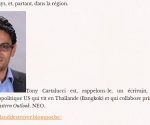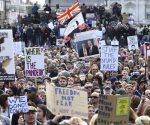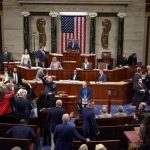Flailing BBC’s third successive licence fee hike stems from vulnerability caused by stubborn and increasing TV tax refusal
The BBC is set to raise the cost of the TV Licence fee a third time in as many years. While corporate-media headlines, when reporting this, tend to concentrate on the potential implications for over-75s (and their DWP paid-for free licences) that may arise as the BBC tries to meet its budgets into the future, there is no evidence of a willingness to publicise more fundamental reasons why the BBC is having to resort to extreme measures to maintain its desired spending levels; i.e. increasing “evasion”. Only moneywise.co.uk (as far as the author could find) would state that “TV Licence fee set to rise as number of viewers cancelling increases to over 860,000” (the relationship between cancellation and “evasion” will be examined shortly).
In 2017, an article published at FBEL analysed the BBC’s own appraisal of its licence fee collection performance for the period 2015/16: BBC “silent weapon” damaged and vulnerable to increasing refusal to pay licence fee (please read it here to understand why the word “evasion” is in quotation marks throughout this article). It was discovered that the BBC had recognised that there was an absolute necessity to reduce licence fee “evasion” in order for financial viability going into the future. That appreciation is current, and reflected in a statement made in the Television Licence Fee Trust Statement for the Year Ending 31 March 2018, which is the document from which the figures appearing in this article will have been extracted (unless otherwise stated):
Increases in revenue will be delivered through uprating the licence fee alongside reducing the cost of collection, reducing evasion and ensuring that household growth (HHG) [new households liable to pay] is captured.
In other words – and despite what is red herring territory concerning licences for the over-75s – there are essentially two things that the BBC can do to affect its ability to maintain a budget: increase the price of licences, and reduce existing and potentially new “evasion” – and do it in an efficient manner. These measures, and the BBC’s capability in implementing them, is all that sustains the corporation’s political effectiveness – and making the BBC less effective is something entirely in the hands of people who could choose not to buy a licence, which is why here at FBEL there is no time for the “Biased BBC” whiny-coward mindset that complains about BBC output, but won’t act to terminate it.
While there is a chance that some Britons might cease buying a TV licence because of alienation through the price rises, the act does involve a matter of principle that most will never come to terms with: the majority of Britons are mugs who will pay – or try to pay – whatever the BBC asks for. Making the TV licence more expensive will therefore not necessarily affect licence fee “evasion” – especially when it comes to BBC presenting its performance in “evasion” deterrence, although losses in real terms may well be hidden by the price hike. And this may well be what happened in the annual period after the first price rise so that, in the 2017/2018 report, “evasion” is understated at 7.04%. Even so, 7.04%, at March 2018, is still an increase on the original figure (retrospectively modified upwards) of 6.91% at March 2017.
In fact, TV licence “evasion” has been rising since the Broadcasters’ Audience Research Board (BARB), which is an organisation that helps the BBC understand how many premises require a licence (television penetration, or TVP – which has fallen from 95.38 to 95.15% of all those potentially licensable), adjusted its methodology for the 2015/2016 figures. Before that, “evasion” had been calculated at a steady 5%, more or less, for a number of years, and the new reality evidently scuppered BBC ambitions to reduce evasion rate to 3.95% by 2020. This failure is at the root of the price rises – which are a victory for those who are acting to damage the BBC by withholding resources.
In March 2017, the Government announced the first fee increase from £145.50 to £147, starting 1st April. Tellingly, it was the first rise since 2010, and perhaps reflected how the BBC might not have considered the previous steady “evasion” rate as a risk to its income. In the BBC’s 2017/18 report there’s a table illustrating budgets versus actual performance for volume of licence sales, and what this shows is that even though the BBC a) did better than forecast in 2016/17, and b) realised the forecast, bar 12,000 sales (with nearly 26 million sales overall worth over £3 billion), in 2017/18, this optimised performance is still not enough to prevent a requirement for price rises. In other words, there is very little room for increasing revenue by increasing volume of sales. This is reflected by the following statement in the BBC report:
Licence sales have been relatively flat with revenue growth due predominantly to the increase in the value of the licence fee.
In 2018, and with the second hike, the price of the fee went up to £150.50. It is due to go up again in 2019 – to £154.50. Mention has been made of inflation in some parts of corporate-media, as if to suggest some necessity to keep the fee in line with it, but it is quite clear what is going on. Results in 2017/18, despite the price increase, did not make the BBC invulnerable to “evasion”, and although the results for 2018/19 are not yet in, the second price increase suggests that the problem continued in that period. The third price increase suggests that the BBC’s big problem will continue into 2020.
A factor that effected the calculation of “evasion” for the 2017/18 period was a so-called fractional decrease in “licences in force” – something that proved a puzzle for the author, for reasons that may become apparent. If, as the BBC report states, the “licence fee evasion rate is calculated as the difference between the number of licences in force and the estimated number of premises that should have a licence”, then a decrease in licences in force should strictly be counted as “evasion”. However, the report also states that the calculated rate of “evasion” for 2017/18 was reduced by an “update… to the estimate of the total number of domestic households, TVP and licences in force”. An associated table then seems to show “evasion” lowered because of a decrease in licences in force – which is unintuitive given the definition for the calculation stated above. It could well be that this figure that eats into the total number for “evasion” is a representation in the statistics for licences that, in one way or another, were not paid for. And possibly related to this is something called “write-offs”, of which the report says this:
The value of write-offs has increased to £131m (2017 £121m). There has been an increase in debts written off for customers who are removed from schemes with instalment balances outstanding on their Licence together with an increase in refunds and other cancellations of licences.
Refunds are definitely not licence fee “evasion”, because the BBC has agreed in these cases that a licence is not required (and they only appear to account for a small portion of the £131m in losses), but where a licence has been issued, is paid in part, and then not paid for, perhaps does apply as such. Potentially, real rate of “evasion” is therefore higher than stated, and obviously the motivation to massage it lower is clear. The BBC wants to be able to make statements like this:
In 2017-18, the licence fee evasion rate was an estimated 7.04%, representing no significant change since 2016-17 (6.91%).
In any case, the report sums up the loss constituted by “evasion” as follows – and it is not insignificant:
As at March 2018, the BBC calculated that there were an estimated 2.0 million licence fee evaders, costing £300 million in lost revenue. This represents £10.60 per licence fee payer, or 7.8% of licence fee revenue collected.
Moreover, the cost of recovering licence fee “evasion” has remained the same, in terms of the percentage of the revenue, from 2016/17 to 2017/18ǂ. This means that in the period that is the subject of the BBC’s report, the cost of recovery has risen, although its writers appear to steer entirely clear of this subject. If there is such an omission (and it’s not a case of the author just missing the detail), then no wonder, for reducing the cost of collection is a target for the BBC for increasing revenue – and it’s why a citizen, with whom the BBC has no business, should allow the corporation to waste money as it executes its shakedown operation harmlessly against him (please read the FBEL article, The TV Licensing Company – a shake down operation – here). Indeed, the BBC’s strategy for increasing revenue by dealing with “evasion” is such an important piece of knowledge for a citizen engaged in defying the corporation that it will be reproduced here in near fullness:
New target evasion rate
2.17 In recent years, the BBC had aspired to reducing the evasion rate to 3.95% by 2020. However… the Unit has not succeeded in moving towards this target in a sustainable way. In our January 2017 value for money report on BBC TV Licence Fee Collection, we recommended that the BBC update its analysis of the minimum level of evasion possible and ‘identify a current, realistic and achievable ambition’.
2.18 We welcome the fact that the Unit commissioned fresh analysis to identify a new theoretical evasion floor, meaning the lowest feasible rate of evasion in the event that enforcement and other TVL resources were unlimited. The analysis identified that the theoretical evasion floor was an estimated 2.76%.
2.19 Based on this, and on its analysis of the pattern of evasion, the BBC set a new target to reduce evasion by 1 percentage point by 2021. This would reduce evasion to just under 6%. The BBC estimates that in order to meet this target it will need to ensure that an additional 280,000 households, relative to a 2016-17 baseline, are licensed by 2021.
Meeting the new target
2.20 The BBC’s current strategy to meet the new target is still under development, but it comprises a combination of actions, including making the licence fee easier to pay, improving customer communications, and increasing deterrent activities. So far, the plans we have reviewed show that the BBC hopes to license more households through the Simple Payment Plan it is piloting. Additionally, it intends to licence more households through better field enforcement activities and improved identification of false No Licence Needed declarations. Finally, plans are being developed to improve compliance through targeted and improved customer communications.
For people who won’t pay for the BBC on principle – which is the real problem the BBC faces as it admitted in the said BBC TV Licence Fee Collection document (which was the subject of the FBEL article linked to at the top of this) – turning up and shaking down naïve punters (“better field enforcement activities”) is not going to work. The big news here is that communicating with TV Licensing to notify that no licence is needed will be to attract attention, and help the BBC construct more efficient recovery campaigns. So, what is actually required instead is a bigger field of anonymity where TV Licensing hasn’t the first idea about the greatest number of households that are not buying a licence. In these circumstances, fieldwork would have to entail wider spread reconnaissance visits in the first instance, a high proportion of which will be fruitless. Remember, a warrant – which is the only (and rare) way that a TV Licensing goon can enter premises to discover whether a householder is watching TV without a licence† [and even then, can only enter if the household is at home to open the door] – is only served by a court when it is entirely convinced that there is evidence that suspicion of proper evasion will be found to be justified.
The BBC’s target “evasion” rate of just under 6% in 2021 might very well be achievable just through the licensing of new households – which is a reflection of how truly unambitious it actually is. Therefore, we are getting into the realms of the BBC using psychological and data manipulation in order to present good news when in fact the narrative is one of failure. In these circumstances, the theoretical evasion floor of 2.76% is pie in the sky. As has been mentioned before, the fact that the BBC has raised the price of the licence fee twice since the end of the period that this article is concerned with suggests that “evasion” continues to be a big problem. The reports for the periods 2018/19, and 2019/20 will be keenly anticipated.
ǂ House of Commons library, Briefing Paper Number CBP-8101, 10 January 2019, “TV Licence fee statistics”.
† In fact, FBEL always recommends its readers not to have cause for a TV Licence; i.e. don’t watch television. That way too, one doesn’t subjects oneself and family to the ever-present programming.


















